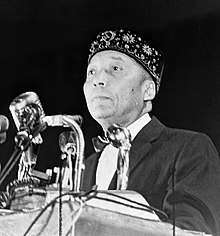User:Iclement/sandbox
African-American Muslims constitute 20% of the total U.S. Muslim population,[1] the majority are Sunni or orthodox Muslims, some of these identify under the community of W. Deen Mohammed.[2][3] The Nation of Islam led by Louis Farrakhan has a membership ranging from 20,000–50,000 members.[4]
A Pew Research Survey in 2019, showed that five percent of the Muslim US population is African-American. Fifty percent of this Muslim Black population were converts, meaning they were not Muslim by birth and converted to the religion sometime in their life. [5]
Pew Research also reports that most African-Americans, however, are still affiliated with Christianity. 79% of African-Americans are Christians.[6]
Louis Farrakhan became the leader of the Nation of Islam in 1981, after he changed the name of his newspaper "The Final Call" to Nation of Islam. Farrakhan is credited with reviving the nation and attempted to restore it using the teachings of Elijah Muhammad.
In 2019, Louis Farrakhan was amongst of list of controversial figures who were banned from social media website Facebook, for his "dangerous" use of anti-semitic language.
Some African-American prisoners cite their reasoning for converting to Islam is due to the religion's messages of peace and support of social justice. [8]

The Moorish Science Temple believed that Islam was the initial religion of Black slaves before they were brought to the colonies, and that it is the true religion of the Black community. [9]
The Great Migration of Blacks from the South to the North helped to encourage many to return to the revival of Islam throughout the Black community. [10]
 | This is a user sandbox of Iclement. You can use it for testing or practicing edits. This is not the sandbox where you should draft your assigned article for a dashboard.wikiedu.org course. To find the right sandbox for your assignment, visit your Dashboard course page and follow the Sandbox Draft link for your assigned article in the My Articles section. |
- ^ Muslim Americans: Middle Class and Mostly Mainstream (Technical report). Pew Research Center. May 22, 2007. Archived from the original on 2007-05-24. Retrieved November 27, 2012.
- ^ Sacirbey, Omar (September 11, 2001). "When Unity is Long Overdue". Beliefnet.com. Retrieved April 20, 2012.
- ^ Terry, Don (May 3, 1993). "Black Muslims Enter Islamic Mainstream". New York Times. Retrieved April 20, 2012.
- ^ "Farrakhan Set to Give Final Address at Nation of Islam's Birthplace". Fox News. December 6, 2011. Retrieved April 20, 2012.
- ^ NW, 1615 L. St; Suite 800Washington; Inquiries, DC 20036USA202-419-4300 | Main202-857-8562 | Fax202-419-4372 | Media. "Black Muslims account for a fifth of all U.S. Muslims, and about half are converts to Islam". Pew Research Center. Retrieved 2019-05-16.
{{cite web}}: CS1 maint: numeric names: authors list (link) - ^ NW, 1615 L. St; Suite 800Washington; Inquiries, DC 20036USA202-419-4300 | Main202-857-8562 | Fax202-419-4372 | Media. "Black Muslims account for a fifth of all U.S. Muslims, and about half are converts to Islam". Pew Research Center. Retrieved 2019-05-16.
{{cite web}}: CS1 maint: numeric names: authors list (link) - ^ Business, Oliver Darcy, CNN. "Louis Farrakhan, Alex Jones and other 'dangerous' voices banned by Facebook and Instagram". CNN. Retrieved 2019-05-16.
{{cite web}}:|last=has generic name (help)CS1 maint: multiple names: authors list (link) - ^ SpearIt; ContributorAuthor; Culture, American Prisons: A. Critical Primer on; Islam, Conversion to (2013-03-07). "Growing Faith: Prisons, Hip-Hop And Islam". HuffPost. Retrieved 2019-05-17.
{{cite web}}:|last2=has generic name (help) - ^ "Black Muslim Movement". Association of Religion Data Archives.
- ^ "Islam In America | History Detectives | PBS". www.pbs.org. Retrieved 2019-05-17.
